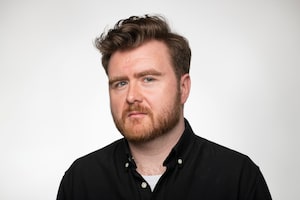- Title: Moral Courage: 19 Profiles of Investigative Journalists
- Author: Anthony Feinstein
- Genre: Illustrated book
- Publisher: G Editions
- Pages: 248
The 15-kilometre walks Cándido Figueredo Ruíz got to take each day as pandemic lockdowns subsided around his new home of west Philadelphia were a literal breath of fresh air when compared with his previous life. As Anthony Feinstein writes in his latest book, Moral Courage, Figueredo Ruíz had spent nearly a quarter-century in Paraguay “marked for death.” He was surrounded for much of that time by seven armed guards who restricted his mobility so he might live to work another day.
All because of what Figueredo Ruíz did for a living: He was a journalist. As Feinstein writes, the guards arrived shortly after Figueredo Ruíz’s first story about corruption for ABC Color, one of Paraguay’s most popular newspapers. For the article he filmed a lawyer propositioning him with cash to stop investigating contraband beer imports. The front-page story led to death threats and a spray of bullets into his house. But he didn’t stop. Nor did he stop after his home and car were each hit by gunfire twice more in his career.
Feinstein is a University of Toronto psychiatry professor and a psychiatrist at Sunnybrook Health Sciences Centre who has spent decades studying psychological distress, with an emphasis on how conflict affects journalists. He’s written numerous books that touch upon the matter, including 2018′s Shooting War: 18 Profiles of Conflict Photographers, which was adapted into the documentary of the same name with The Globe and Mail.
He’s followed that up with the spiritual sequel, Moral Courage: 19 Profiles of Investigative Journalists, itself adapted from a Globe and Mail series as a coffee-table book filled with photos organized by Clare Vander Meersch.
Investigative journalism is hard enough to pursue in the democracies of the West in the era of centralized message control, institutional self-interest, archaic and labyrinthine freedom of information regimes, ranks-closing boards of directors and, in Canada – as I’m reminded each time I wind up reporting in other Western countries – a distinct fear of shaking the tree.
In the wider world of investigative journalism, however, these obstacles are comparatively safe and easy to overcome. Feinstein has sought out reporters and editors who have risked everything, up to and including their lives, to dig for the truth in the face of often corrupt governments that depend on their own narratives to sustain their power. “Journalists who tell an inconvenient truth are treated brutally,” he writes.
And he seeks not just to celebrate the work of journalists such as Figueredo Ruíz but to study their motivations. Feinstein offers theories about the risks they take, one of which is evident in the book’s title: “An extraordinary moral courage is required to endure and continue working.” But he also delves into the world of moral injury – “a condition that arises from witnessing, perpetrating, or failing to prevent acts that transgress a person’s code of ethics or moral compass.”
He suggests that some of the journalists he profiles in the book may feel a sense of shame, perhaps from feeling party to a corrupt government’s decisions or, in at least one lethal case, a sense of survivor’s guilt. Others, he postulates, are driven by anger or disgust.
And so, across 19 profiles, Feinstein takes readers into the tense and tenuous situations that journalists have lived or are living through.
There’s the story of Can Dundar in Turkey, who, after publishing a piece on a Turkish intelligence group providing weapons to radical Islamists in Syria, was told by President Recep Tayyip Erdogan that he would “pay a heavy price.” Dundar later survived an assassination attempt on the same day he received a nearly six-year prison sentence for allegedly unveiling state secrets. There’s the story of Pavla Holcova of the Czech Republic, who, even after the murder of a colleague, told Feinstein she “could no longer experience joy,” but declared: “Doing nothing is not an option.”
And then there’s the tale of Anna Politkovskaya, shot dead in her Moscow apartment building in 2006 after years spent investigating Russia’s brutality in Chechnya. “Politkovskaya bore witness but, unlike the vast majority of her fellow citizens, could not keep quiet about what she saw,” Feinstein writes.
This is echoed by many of the journalists in Moral Courage. As Zimbabwean reporter Hopewell Rugoho-Chin’ono tells him: “I don’t want to be remembered as the person who did nothing.”
Josh O’Kane is the author, most recently, of Sideways: The City Google Couldn’t Buy. He has reported for The Globe and Mail since 2011.
 Josh O’Kane
Josh O’Kane